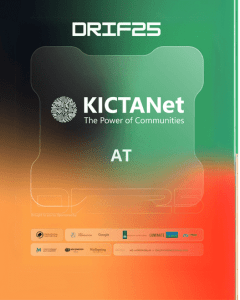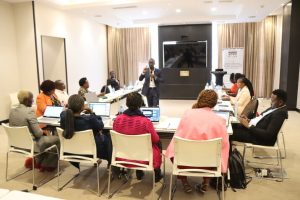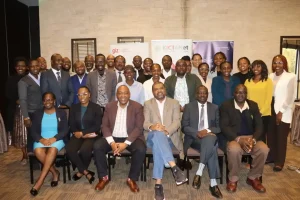It wouldn’t be enough to separate the business. Anti-competitive practices
have to be checked even across different business entities. Eg- I don’t see
how the amendment would heal the tying problem (You can only get product X
when you are subscribed to product Y). Tying is both a consumer protection
and anti-competitive issue which in my opinion deserves a lot more
attention than it is currently getting.
Very recently- I have seen notices from businesses that they no longer
accept cash Payments. They then list a finite number of payment options
which are not representative of all the options available in the market.
This trend is quickly growing too. Such business choices shape the market
instead of letting the market shape itself.
On Fri, 25 Oct 2019 at 11:41, Barrack Otieno via kictanet <
kictanet@lists.kictanet.or.ke> wrote:
> Reminds me of Nairobi County Government. They stopped issuing unified
> licenses since they felt they were losing potential income from multiple
> streams. I suspect this is the thinking around separation of products and
> services offered by Telcos.
>
> Best Regards
>
> On Fri, 25 Oct 2019, 11:14 am Adam Lane via kictanet, <
> kictanet@lists.kictanet.or.ke> wrote:
>
>> It is impossible to split telecommunications businesses in the digital
>> economy. If a telco sells connectivity to a farm or a farmer, is it an
>> agricultural company? Sells to a bank, is it a finance company? Maybe not.
>> Then what if it adds some services to that connectivity… what service
>> counts as additional businesses? And what if it is a partner’s service?
>> Telcos’ have the unique capability to reach every single person in this
>> country, they should be encouraged to do that rather than hindered. Right
>> now e-health, e-agri etc are still really under-developed in this country.
>> They need more support and stronger players to push in that space… leaving
>> it to start-ups on their own will not succeed.
>>
>>
>>
>> Besides, what if the telco just creates a separate company 100% owned
>> (and controlled and managed) by itself, then what is the point of that – it
>> is just a department of the telco.
>>
>>
>>
>> Surely if there is already a framework in place for licenses in any
>> industry, and if a telco gets into that business it would need to apply for
>> that license anyway; for example if the telco started selling medicines
>> online, then it (or its partner) would need the relevant license, and I
>> don’t think anyone would argue with that.
>>
>>
>>
>>
>>
>> *From:* kictanet [mailto:kictanet-bounces+adam.lane=
>> huawei.com@lists.kictanet.or.ke] *On Behalf Of *Ali Hussein via kictanet
>> *Sent:* Friday, October 25, 2019 6:29 AM
>> *To:* Adam Lane <adam.lane@huawei.com>
>> *Cc:* Ali Hussein <ali@hussein.me.ke>; KICTAnet ICT Policy Discussions <
>> kictanet@lists.kictanet.or.ke>
>> *Subject:* Re: [kictanet] KICA Amendments: Control of anti-competitive
>> practices by telecommunication operators
>>
>>
>>
>> Exactly!
>>
>> *Ali Hussein*
>>
>>
>>
>> +254 0713 601113
>>
>>
>>
>> Twitter: @AliHKassim
>>
>> Skype: abu-jomo
>>
>> LinkedIn: ke.linkedin.com/in/alihkassim
>>
>>
>>
>> “We are what we repeatedly do. Excellence, therefore, is not an act but a
>> habit.” ~ Aristotle
>>
>>
>>
>>
>>
>> Sent from my iPad
>>
>>
>>
>> On 25 Oct 2019, at 6:22 AM, Barrack Otieno <otieno.barrack@gmail.com>
>> wrote:
>>
>>
>>
>> Dear Ali,
>>
>>
>>
>> Many thanks for your insightfull responses. This is where we need expert
>> guidance, what i know is that you don’t start taxing a baby at birth, you
>> nurture them until they start boasting of their own balance sheet then you
>> strike. I think we are trying to solve the wrong problem with the wrong
>> approach. I use mpesa to buy airtime for my Telkom line. Not sure if that
>> is competition or coopetition. I bet what makes the later tick is
>> responsibility, reliability and resilience. Basically what the Customer
>> wants. The other players should first up their game and then talk about
>> dominance. Secondly do we really have a digital market worth breaking up or
>> are we walking in imagination. Do we even have a local definition of the
>> digital economy? Every sector that is taxed needs budgetary facilitation
>> and support from government. I bet that would be a good starting point.
>>
>>
>>
>> On Fri, 25 Oct 2019, 6:06 am Ali Hussein, <ali@hussein.me.ke> wrote:
>>
>> @Barrack
>>
>>
>>
>> To quote your mosquito and hammer analogy.
>>
>>
>>
>> Most people don’t know that from a technological perspective Mpesa was
>> actually inferior to the other players in the ecosystem. Airtel Money and
>> now T-Kash. What Safaricom did and continue to do is simple:-
>>
>>
>>
>> They executed and continue to execute better than everyone else.
>> Including the banks.
>>
>>
>>
>> Let me give you some examples.
>>
>>
>>
>> 1. There will be no Fintech to speak of today in Kenya without Mpesa.
>> Fact.
>>
>> 2. Mobile Banking is almost 100% based on Mpesa.
>>
>> 3. The Banks that have the lion’s share of mobile lending (Not Tala, not
>> Branch), but KCB and NCBA have that pivotal position because of their
>> partnership with Safaricom.
>>
>> 4. Yet still more than 80% of transactions in this country is still in
>> cash. Instead of everyone and his grandmother crying foul that Safaricom is
>> dominant why not go for the 80% that still operate cash? We have a scarcity
>> mentality, is what we have.
>>
>>
>>
>> Let me go back to the issue of breaking up Mpesa.
>>
>>
>>
>> I ask, is that really the best option? Us Africans have one serious
>> problem. We think too small. In terms of our little countries and villages.
>> My humble remedy to this ‘false’ dominance:-
>>
>>
>>
>> 1. Assist Safaricom to become globally dominant. The remittance market
>> worldwide moves $600 billion every year. Peer to peer. The kind of business
>> that Mpesa has excelled in. What is Mpesa’s global market share in
>> remittances? Less than 1%! What really are we talking about??
>>
>>
>>
>> 2. Put in place policies to ensure that Safaricom contributes a
>> percentage into a Sovereign Fund to fund and activate a FinTech Ecosystem
>> that is second to none in the world – Open Banking, APIs ecosystem, seed
>> funding etc. instead of cutting off the goose that lays the golden eggs
>> nurture her and let her produce more geese that lay golden eggs.
>>
>>
>>
>> 3. Mpesa is a defacto NeoBank (a bank that is a 100% digital and reaches
>> customers using mobile and computer networks only and don’t require
>> physical branches). Mpesa is forced to partner with banks because of
>> outdated financial policies and regulations that need to be kicked in the
>> butt and brought into the 22nd Century, kicking and screaming!
>>
>>
>>
>> 4. Create an Open Banking/Open Mobile environment where players are
>> literally forced to share their networks via APIs so that players can
>> compete on an even playing field. Let players charge for their rails if
>> they must. Within reasonable parameters. In fact, Safaricom’s *Daraja
>> Platform *already does this well.
>>
>>
>>
>> This, in my humble opinion, will be the best way to ‘tame’ dominance.
>> Market Failures and breaking up companies is an excuse for lazy policy
>> makers and regulators to correct a ‘mistake’ that customers want. Abuse of
>> ‘dominance’ won’t have happened int the first place if policy makers and
>> regulators didn’t suffer from a disease I call #StateCapture. A malaise
>> that is brought about by not seeing the bigger picture.
>>
>>
>>
>> We don’t have a problem of dominance. We have a problem of laziness.
>> Let’s cure that!
>>
>>
>>
>> *Ali Hussein*
>>
>>
>>
>> +254 0713 601113
>>
>>
>>
>> Twitter: @AliHKassim
>>
>> Skype: abu-jomo
>>
>> LinkedIn: ke.linkedin.com/in/alihkassim
>>
>>
>>
>> “We are what we repeatedly do. Excellence, therefore, is not an act but a
>> habit.” ~ Aristotle
>>
>>
>>
>>
>>
>> Sent from my iPad
>>
>>
>>
>> On 24 Oct 2019, at 11:55 PM, Barrack Otieno via kictanet <
>> kictanet@lists.kictanet.or.ke> wrote:
>>
>>
>>
>> I think as the business and the sector matures separation will be key.
>> Convergence also makes it hard to measure the digital economy from a
>> product or service perspective.
>>
>>
>>
>> Regards
>>
>>
>>
>> On Thu, 24 Oct 2019, 11:51 pm Mwendwa Kivuva, <
>> Kivuva@transworldafrica.com> wrote:
>>
>> Thanks Barrack.
>>
>>
>>
>> To your question, the main aim of this bill as indicated in the document
>> is to “aid in the control of anti-competitive practices by large
>> telecommunication industries in the sector.”
>>
>>
>>
>> Just for context, I saw the acting CEO of Safaricom in the news today
>> challenging the dominance and competition issue.
>>
>>
>>
>> He said that Safaricom’s other main non-telecommunication business,
>> M-pesa, could never have been successful without being bundled with voice
>> and data. He said that the first 5 years of M-pesa was never successful. It
>> was subsidized by voice and data. He also said he does not see the point of
>> separating M-pesa to punish Safaricom for investing heavily to make the
>> business successful.
>>
>> On Thursday, 24 October 2019, Barrack Otieno <otieno.barrack@gmail.com>
>> wrote:
>>
>> Dear Kivuva,
>>
>>
>>
>> I am confused on this one though it makes sense to distill the components
>> of converged networks. In a way, it will provide better premises for
>> measuring the digital economy. I am ok with this clause. It needs further
>> clarity and meat.
>>
>>
>>
>> Regards
>>
>>
>>
>> Regards
>>
>>
>>
>> On Thu, 24 Oct 2019, 9:32 am Mwendwa Kivuva via kictanet, <
>> kictanet@lists.kictanet.or.ke> wrote:
>>
>> This is a continuation of the debate to amend the Kenya Information and
>> Communications Act (KICA).
>>
>>
>>
>> Comments and thoughts are welcomed for yesterday’s debate moderated by
>> Mercy Mutemi on the regulation of social media and blogging. We can
>> continue contributing through that thread.
>>
>>
>>
>> Today, we discuss the amendments to KCIA published on March 15th, 2019,
>> recommended by Hon Elisha Odhiambo, MP, seeking to add a new section 25A on
>> splitting telecommunications businesses, and section 34A on the
>> compensation of telecommunications consumers on call drops, and section 84J
>> prescribing how the Universal Service Fund (USF) should be used.
>>
>>
>>
>> *The new Section 25A requires telecommunications operators to*
>>
>> – Obtain a license for additional business.
>>
>> – Legally split the telecommunications business from additional business.
>>
>> – Provide separate accounts and reports in respect of all business
>> carried out.
>>
>> – Require Communications Authority to report compliance annually to
>> Parliament.
>>
>>
>>
>> The reasons given for this bill are to allow telecommunications companies
>> to engage in other businesses, and also aid in the control of
>> anti-competitive practices by large industries in the sector.
>>
>>
>>
>> What are your thoughts on this amendment? Do we have any specific
>> recommendations we can pass to Parliament through the public participation
>> process?
>>
>>
>>
>> Warm Regard
>>
>> _______________________________________________
>> kictanet mailing list
>> kictanet@lists.kictanet.or.ke
>> lists.kictanet.or.ke/mailman/listinfo/kictanet
>> Twitter: http://twitter.com/kictanet
>> Facebook: www.facebook.com/KICTANet/
>>
>> Unsubscribe or change your options at
>> lists.kictanet.or.ke/mailman/options/kictanet/otieno.barrack%40gmail.com
>>
>> The Kenya ICT Action Network (KICTANet) is a multi-stakeholder platform
>> for people and institutions interested and involved in ICT policy and
>> regulation. The network aims to act as a catalyst for reform in the ICT
>> sector in support of the national aim of ICT enabled growth and development.
>>
>> KICTANetiquette : Adhere to the same standards of acceptable behaviors
>> online that you follow in real life: respect people’s times and bandwidth,
>> share knowledge, don’t flame or abuse or personalize, respect privacy, do
>> not spam, do not market your wares or qualifications.
>>
>> _______________________________________________
>> kictanet mailing list
>> kictanet@lists.kictanet.or.ke
>> lists.kictanet.or.ke/mailman/listinfo/kictanet
>> Twitter: http://twitter.com/kictanet
>> Facebook: www.facebook.com/KICTANet/
>>
>> Unsubscribe or change your options at
>> lists.kictanet.or.ke/mailman/options/kictanet/info%40campusciti.com
>>
>> The Kenya ICT Action Network (KICTANet) is a multi-stakeholder platform
>> for people and institutions interested and involved in ICT policy and
>> regulation. The network aims to act as a catalyst for reform in the ICT
>> sector in support of the national aim of ICT enabled growth and development.
>>
>> KICTANetiquette : Adhere to the same standards of acceptable behaviors
>> online that you follow in real life: respect people’s times and bandwidth,
>> share knowledge, don’t flame or abuse or personalize, respect privacy, do
>> not spam, do not market your wares or qualifications.
>>
>> _______________________________________________
>> kictanet mailing list
>> kictanet@lists.kictanet.or.ke
>> lists.kictanet.or.ke/mailman/listinfo/kictanet
>> Twitter: http://twitter.com/kictanet
>> Facebook: www.facebook.com/KICTANet/
>>
>> Unsubscribe or change your options at
>> lists.kictanet.or.ke/mailman/options/kictanet/otieno.barrack%40gmail.com
>>
>> The Kenya ICT Action Network (KICTANet) is a multi-stakeholder platform
>> for people and institutions interested and involved in ICT policy and
>> regulation. The network aims to act as a catalyst for reform in the ICT
>> sector in support of the national aim of ICT enabled growth and development.
>>
>> KICTANetiquette : Adhere to the same standards of acceptable behaviors
>> online that you follow in real life: respect people’s times and bandwidth,
>> share knowledge, don’t flame or abuse or personalize, respect privacy, do
>> not spam, do not market your wares or qualifications.
>>
> _______________________________________________
> kictanet mailing list
> kictanet@lists.kictanet.or.ke
> lists.kictanet.or.ke/mailman/listinfo/kictanet
> Twitter: http://twitter.com/kictanet
> Facebook: www.facebook.com/KICTANet/
>
> Unsubscribe or change your options at
> lists.kictanet.or.ke/mailman/options/kictanet/kaninimutemi%40gmail.com
>
> The Kenya ICT Action Network (KICTANet) is a multi-stakeholder platform
> for people and institutions interested and involved in ICT policy and
> regulation. The network aims to act as a catalyst for reform in the ICT
> sector in support of the national aim of ICT enabled growth and development.
>
> KICTANetiquette : Adhere to the same standards of acceptable behaviors
> online that you follow in real life: respect people’s times and bandwidth,
> share knowledge, don’t flame or abuse or personalize, respect privacy, do
> not spam, do not market your wares or qualifications.
>



